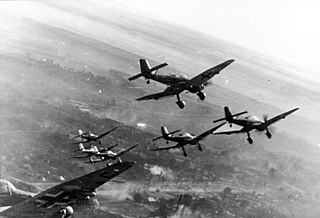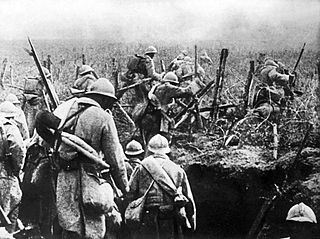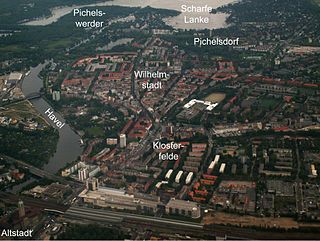
Berlin is the capital and largest city of Germany, both by area and by population. Its more than 3.85 million inhabitants make it the European Union's most populous city, as measured by population within city limits. Simultaneously, the city is one of the states of Germany and is the third smallest state in the country in terms of area. Berlin is surrounded by the state of Brandenburg, and Brandenburg's capital Potsdam is nearby. The urban area of Berlin has a population of 4.5 million and is therefore the most populous urban area in Germany. The Berlin-Brandenburg capital region has around 6.2 million inhabitants and is Germany's second-largest metropolitan region after the Rhine-Ruhr region, and the fifth-biggest metropolitan region by GDP in the European Union.

Germany, officially the Federal Republic of Germany, is a country in the western region of Central Europe. It is the second-most populous country in Europe after Russia, and the most populous member state of the European Union. Germany lies between the Baltic and North Sea to the north and the Alps to the south. Its 16 constituent states have a total population of over 84 million, covering a combined area of 357,600 km2 (138,100 sq mi) and sharing land borders with Denmark to the north, Poland and the Czech Republic to the east, Austria and Switzerland to the south, and France, Luxembourg, Belgium, and the Netherlands to the west. The nation's capital and most populous city is Berlin and its main financial centre is Frankfurt; the largest urban area is the Ruhr.

German is a West Germanic language mainly spoken in Western and Central Europe. It is the most widely spoken and official or co-official language in Germany, Austria, Switzerland, Liechtenstein, and the Italian province of South Tyrol. It is also an official language of Luxembourg and Belgium, as well as a recognized national language in Namibia. Outside Germany, it is also spoken by German communities in France (Alsace), Czech Republic, Poland, Slovakia, and Hungary (Sopron).

The German Empire, also referred to as Imperial Germany, the Second Reich or simply Germany, was the period of the German Reich from the unification of Germany in 1871 until the November Revolution in 1918, when the German Reich changed its form of government from a monarchy to a republic.

East Germany, officially known as the German Democratic Republic, was a country in Central Europe from its formation on 7 October 1949 until its reunification with West Germany on 3 October 1990. Until 1989, it was generally viewed as a communist state and described itself as a socialist "workers' and peasants' state". The economy of this country was centrally planned and state-owned. Although the GDR had to pay substantial war reparations to the Soviets, it became the most successful economy in the Eastern Bloc.

Nazi Germany, officially known as the German Reich and later the Greater German Reich, is a term used to describe the German state between 1933 and 1945, when Adolf Hitler and the Nazi Party controlled the country, transforming it into a totalitarian dictatorship. The Third Reich, meaning "Third Realm" or "Third Empire", referred to the Nazi claim that Nazi Germany was the successor to the earlier Holy Roman Empire (800–1806) and German Empire (1871–1918). The Third Reich, which the Nazis referred to as the Thousand-Year Reich, ended in May 1945, after only 12 years, when the Allies defeated Germany and entered the capital, Berlin, ending World War II in Europe.

World War II or the Second World War was a global conflict that lasted from 1939 to 1945. The vast majority of the world's countries, including all the great powers, fought as part of two opposing military alliances: the Allies and the Axis. Many participating countries invested all available economic, industrial, and scientific capabilities into this total war, blurring the distinction between civilian and military resources. Aircraft played a major role, enabling the strategic bombing of population centres and delivery of the only two nuclear weapons ever used in war. It was by far the deadliest conflict in history, resulting in 70–85 million fatalities. Millions died due to genocides, including the Holocaust, as well as starvation, massacres, and disease. In the wake of Axis defeat, Germany, Austria, and Japan were occupied, and war crime tribunals were conducted against German and Japanese leaders.
Barnim is a district in Brandenburg, Germany. It is bounded by Poland, the district of Märkisch-Oderland, the city state of Berlin and the districts of Oberhavel and Uckermark.

Fußball-Club Bayern München e. V., also known as FC Bayern, Bayern Munich, or simply Bayern, is a German professional sports club based in Munich, Bavaria. It is best known for its professional men's association football team, which plays in the Bundesliga, the top tier of the German football league system. Bayern is the most successful club in German football history, having won a record 33 national titles, including eleven consecutively since 2013, and 20 national cups, along with numerous European honours.

The Germany national football team represents Germany in men's international football and played its first match in 1908. The team is governed by the German Football Association, founded in 1900. Between 1949 and 1990, separate German national teams were recognised by FIFA due to Allied occupation and division: the DFB's team representing the Federal Republic of Germany, the Saarland team representing the Saar Protectorate (1950–1956) and the East Germany team representing the German Democratic Republic (1952–1990). The latter two were absorbed along with their records; the present team represents the reunified Federal Republic. The official name and code "Germany FR (FRG)" was shortened to "Germany (GER)" following reunification in 1990.

Bayer 04 Leverkusen, officially known as Bayer 04 Leverkusen Fußball GmbH and also known as Bayer Leverkusen or simply Leverkusen, is a professional football club based in Leverkusen, North Rhine-Westphalia, Germany. The club competes in the Bundesliga, the top tier of German football, and plays its home matches at the BayArena.

The Bundesliga, sometimes referred to as the Fußball-Bundesliga or 1. Bundesliga, is a professional association football league in Germany. At the top of the German football league system, the Bundesliga is Germany's primary football competition. The Bundesliga comprises 18 teams and operates on a system of promotion and relegation with the 2. Bundesliga. Seasons run from August to May. Games are played on Fridays, Saturdays and Sundays. All of the Bundesliga clubs take part in the DFB-Pokal cup competition. The winner of the Bundesliga qualifies for the DFL-Supercup.

Adolf Hitler was an Austrian-born German politician who was the dictator of Nazi Germany from 1933 until his suicide in 1945. He rose to power as the leader of the Nazi Party, becoming the chancellor in 1933 and then taking the title of Führer und Reichskanzler in 1934. During his dictatorship, he initiated the European theatre of World War II by invading Poland on 1 September 1939. He was closely involved in military operations throughout the war and was central to the perpetration of the Holocaust: the genocide of about six million Jews and millions of other victims.

World War I or the First World War was a global conflict between two coalitions: the Allies and the Central Powers. Fighting took place throughout Europe, the Middle East, Africa, the Pacific, and parts of Asia. One of the deadliest wars in history, it resulted in an estimated 9 million soldiers dead and 23 million wounded, plus up to 8 million civilian deaths from numerous causes including genocide. The movement of large numbers of troops and civilians during the war was a major factor in spreading the 1918 Spanish flu pandemic.

is a small town in the district of Barnim, in Brandenburg, Germany. It is situated within the Schorfheide-Chorin Biosphere Reserve on the isthmus between the lakes Grimnitzsee in the north and Werbellinsee in the south, about 17 km (11 mi) northwest of the district's capital Eberswalde and 55 km (34 mi) northeast of the Berlin city centre. The municipality is the administrative seat of the Amt Amt Joachimsthal.

Lake Werbellin is a lake in the Barnim district of Brandenburg, Germany. It is located south of Joachimsthal in the Schorfheide-Chorin Biosphere Reserve. The southern shore belongs to the Schorfheide municipality. With a surface area of 7.82 square kilometers (3.02 sq mi) it is the fourth largest lake in Brandenburg and with 51 meters (167 ft) the second deepest.

Austria, formally the Republic of Austria, is a landlocked country in Central Europe, lying in the Eastern Alps. It is a federation of nine federal states, one of which is the capital, Vienna, the most populous city and federal state. Austria is bordered by Germany to the northwest, the Czech Republic to the north, Slovakia to the northeast, Hungary to the east, Slovenia and Italy to the south, and Switzerland and Liechtenstein to the west. The country occupies an area of 83,879 km2 (32,386 sq mi) and has a population of around 9 million.

Wilhelmstadt is a German locality (Ortsteil) of Berlin in the borough (Bezirk) of Spandau.
Nazism, the common name in English for National Socialism, is the far-right totalitarian socio-political ideology and practices associated with Adolf Hitler and the Nazi Party (NSDAP) in Nazi Germany. During Hitler's rise to power in 1930s Europe, it was frequently referred to as Hitlerism. The later related term "neo-Nazism" is applied to other far-right groups with similar ideas which formed after the Second World War.

Heerstraße runs from Theodor-Heuss-Platz in Berlin-Charlottenburg to the western city border of Berlin in the locality of Staaken in the borough of Spandau. It is part of Bundesstraße 5; from Theodor-Heuss-Platz to Wilhelmstraße it is forms part of Bundesstraße 2. With a length of around 10 kilometres, it is one of the longest streets in Berlin and an important commuter route. The street is a five-lane expressway (Kraftfahrstraße), depending on traffic flow the middle lane is available during rush hours in the morning (eastbound) and in the evening (westbound).



















